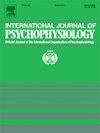The effect of chronotype in risky decision making: An ERP study
IF 2.6
3区 心理学
Q3 NEUROSCIENCES
引用次数: 0
Abstract
Chronotype, the individual predisposition toward morningness or eveningness, is associated with behavioral and emotion regulation traits such as impulsivity, reward sensitivity, and self-control. However, the extent to which it modulates risky decision-making and neural feedback processing remains unclear. This study examined behavioral (percentage of risky choices and reaction time (RT)) and electrophysiological (feedback-related negativity (FRN) and P300 components) differences in risky choices and feedback evaluation individual differences in chronotypes. Chronotype was determined using the Morningness–Eveningness Questionnaire (MEQ) and Munich Chronotype Questionnaire (MCTQ). 39 Participants (20 morning-types, 19 evening-types; aged 18–31) completed a modified monetary gambling task during EEG recording. Behaviorally, evening-types made more risky choices than morning-types, particularly after gain-correct and loss-error feedback. They also responded faster overall, with the most pronounced RT reductions after error feedback, suggesting diminished post-error slowing and greater impulsivity. Electrophysiologically, FRN amplitudes were attenuated in evening-types, especially in gain-correct and loss-error conditions. FRN amplitudes correlated with both MEQ and MCTQ scores, indicating that greater eveningness was associated with reduced neural sensitivity to outcome feedback. In contrast, no significant group differences emerged for P300 amplitudes, although both groups showed enhanced P300 responses to gain-correct outcomes, reflecting feedback salience. These findings suggest that chronotype is linked to distinct behavioral and neural profiles in risky decision-making. Eveningness is characterized by greater impulsivity, risk preference, and attenuated feedback monitoring, which may increase vulnerability to maladaptive risky decision-making in real-world contexts.
时间类型对风险决策的影响:一项ERP研究。
时间型,即个人倾向于早起或晚起,与行为和情绪调节特征有关,如冲动、奖励敏感性和自我控制。然而,它在多大程度上调节风险决策和神经反馈处理仍不清楚。本研究考察了风险选择的行为差异(风险选择百分比和反应时间(RT))和电生理差异(反馈相关负性(FRN)和P300成分)以及反馈评估个体在时型上的差异。时间类型采用早晚性问卷(MEQ)和慕尼黑时间类型问卷(MCTQ)确定。39名参与者(20名早晨型,19名晚上型,年龄18-31岁)在EEG记录期间完成了修改后的货币赌博任务。从行为上看,夜猫子比早起的人做出了更冒险的选择,尤其是在获得正确和损失错误反馈之后。总的来说,他们的反应速度也更快,在错误反馈后,RT的减少最为明显,这表明错误后的反应速度减慢了,冲动更大了。电生理学上,频响波幅值在夜间类型中衰减,特别是在增益校正和损耗误差条件下。FRN振幅与MEQ和MCTQ评分相关,表明更大的均匀性与神经对结果反馈的敏感度降低有关。相比之下,P300振幅没有显著的组间差异,尽管两组对获得正确结果的P300反应都有所增强,这反映了反馈显著性。这些发现表明,时间类型与风险决策中不同的行为和神经特征有关。均匀性的特点是更大的冲动性、风险偏好和减弱的反馈监控,这可能会增加现实环境中风险决策不适应的脆弱性。
本文章由计算机程序翻译,如有差异,请以英文原文为准。
求助全文
约1分钟内获得全文
求助全文
来源期刊
CiteScore
5.40
自引率
10.00%
发文量
177
审稿时长
3-8 weeks
期刊介绍:
The International Journal of Psychophysiology is the official journal of the International Organization of Psychophysiology, and provides a respected forum for the publication of high quality original contributions on all aspects of psychophysiology. The journal is interdisciplinary and aims to integrate the neurosciences and behavioral sciences. Empirical, theoretical, and review articles are encouraged in the following areas:
• Cerebral psychophysiology: including functional brain mapping and neuroimaging with Event-Related Potentials (ERPs), Positron Emission Tomography (PET), Functional Magnetic Resonance Imaging (fMRI) and Electroencephalographic studies.
• Autonomic functions: including bilateral electrodermal activity, pupillometry and blood volume changes.
• Cardiovascular Psychophysiology:including studies of blood pressure, cardiac functioning and respiration.
• Somatic psychophysiology: including muscle activity, eye movements and eye blinks.

 求助内容:
求助内容: 应助结果提醒方式:
应助结果提醒方式:


